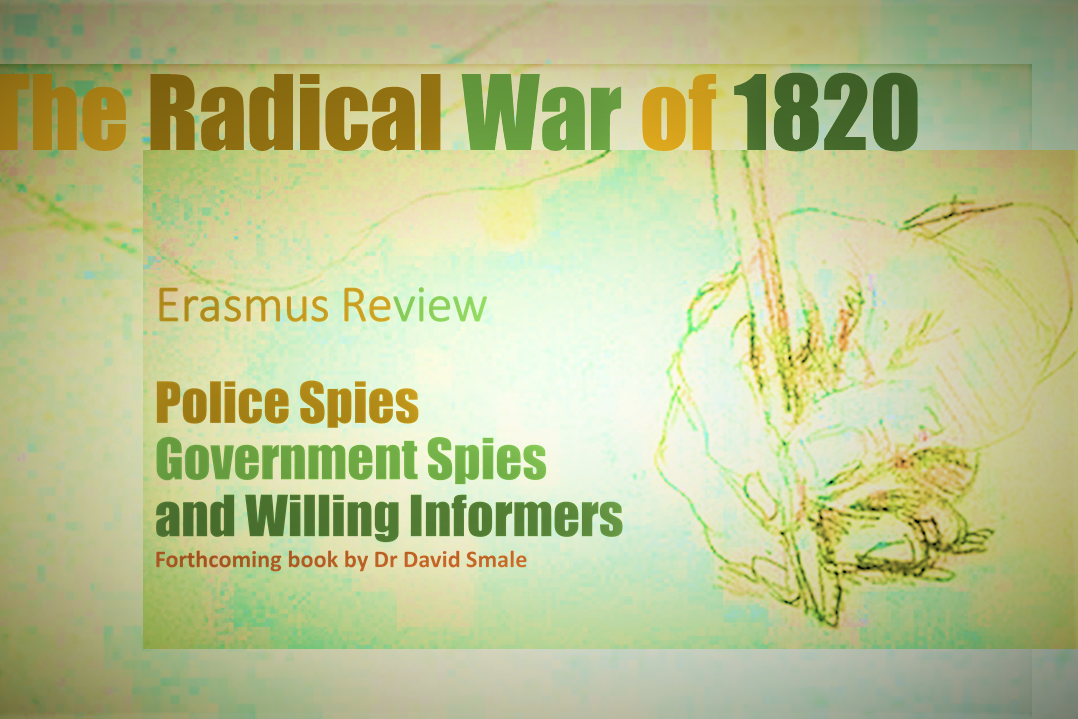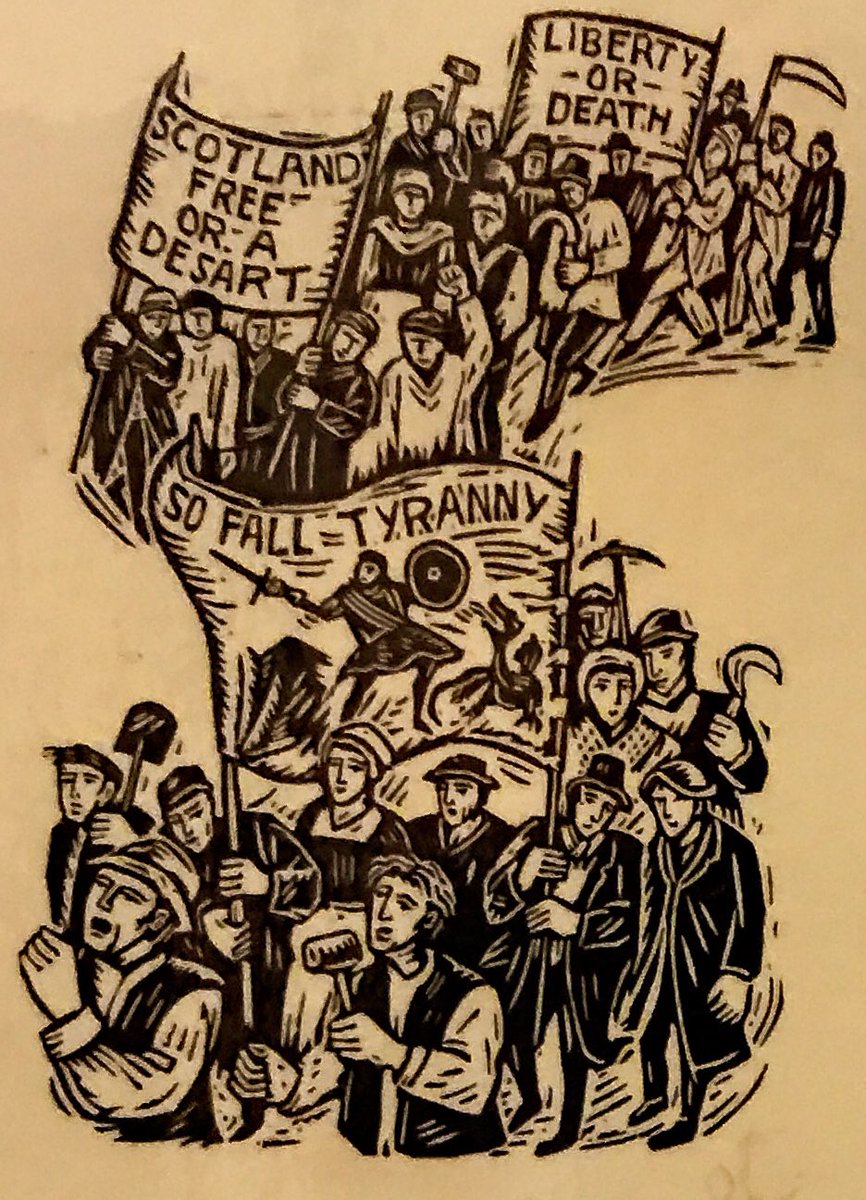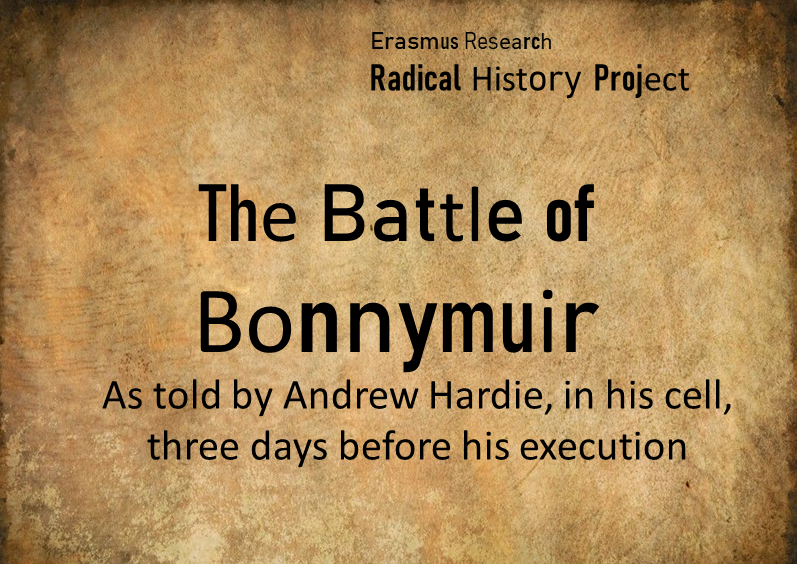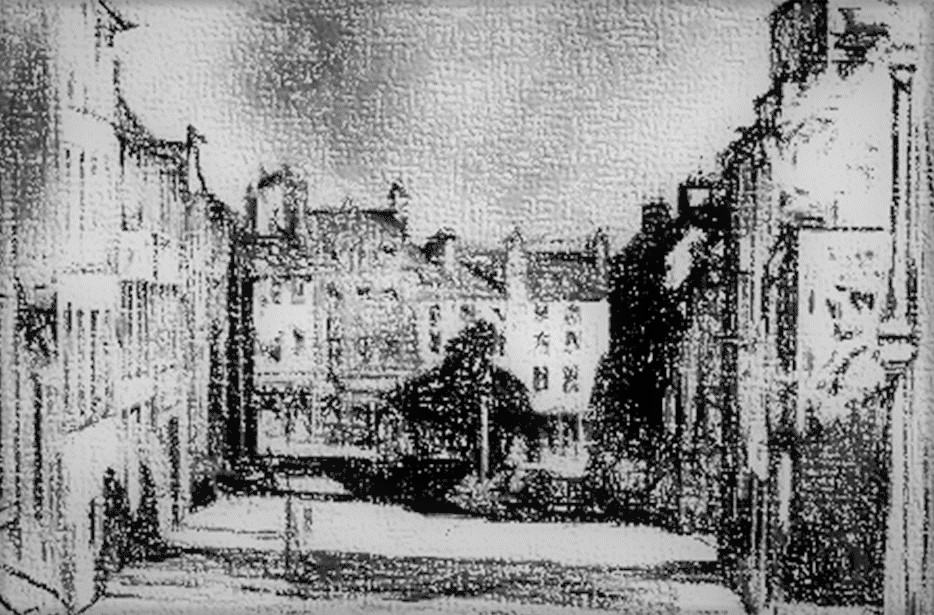
This is the second section of Chapter VIII of the serialisation, the wording reproduced exactly as it appeared in the Stirling Sentinel, on Tuesday 2nd April 1889.
On the 6th July the eighteen men implicated in the Bonnymuir Case were again placed at the bar, and the caption and indictment against them was read. The indictment was a very long one, and we only quote here the abstract which was afterwards furnished to the jury which tried Andrew Hardie:
First Count – Compassing and imagining the death of the King, including 19 overt acts, viz.:-
- Conspiring to devise plans to subvert the constitution.
- Conspiring to levy war, and to subvert the constitution.
- For publishing and posting up a treasonable address to the inhabitants of Great Britain and Ireland to incite the soldiers of the King and other subjects to rebellion.
- For publishing and posting up printed addresses to the inhabitants of Great Britain and Ireland stating the substance only of such addresses, with similar intent, as in 3rd overt Act.
- For composing and printing, and posting up divers addresses, containing solicitations to the troops and subjects of the King to levy war.
- For assembling together, and whilst so assembled, making speeches to invite the subjects to rebellion.
- For purchasing and providing arms, in order to attack the soldiers of the King, and to make war against the King.
- For assembling and parading with arms, and attacking the houses of divers subjects and taking therefrom arms and ammunition with similar intent as in the last overt act.
- For manufacturing arms with similar intent.
- For levying war.
- For endeavouring to seduce the troops of the King from their allegiance.
- For detaining and imprisoning divers subjects with intent, by duress, to comp them to join in levying war.
- For forcing divers subjects to discharge and turn off their workmen.
- For striking work and compelling and persuading others to do the same.
- For sending persons to Egland to incite the liege subjects of the King there to acts of treason.
- For subscribing money for the purpose of procuring arms.
- For exhorting and persuading certain liege subjects of the King to procure arms to be employed in rebellion.
- For giving notice of meetings to be held for the purpose of consulting as to the means of raising war.
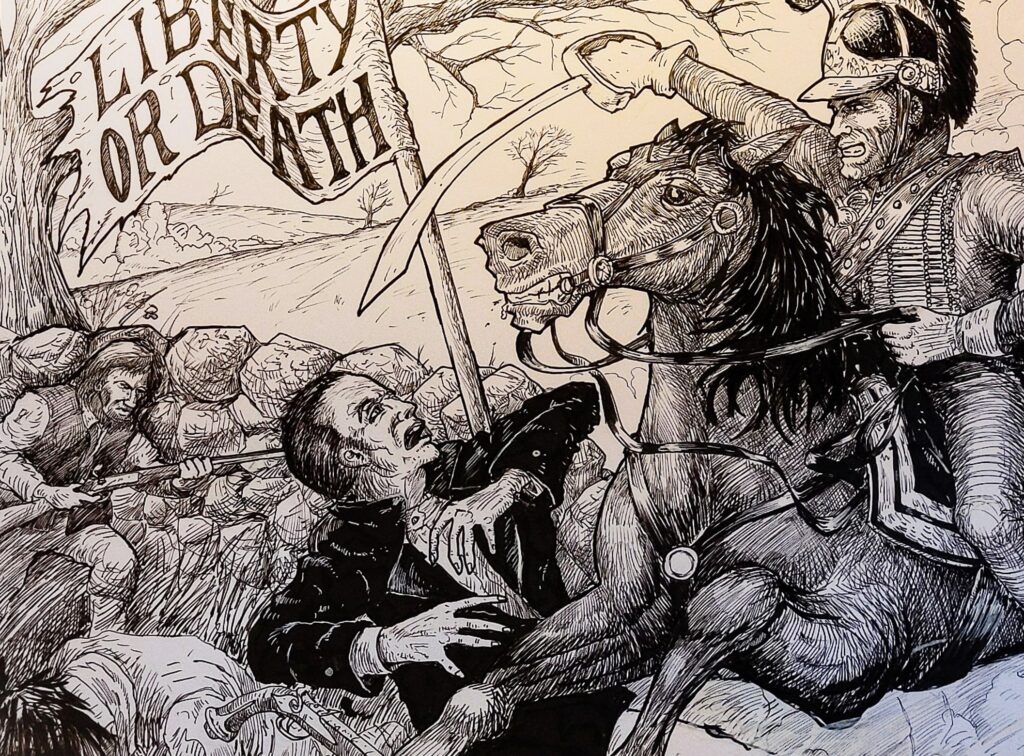
Second Count – Levying war.
Third Count – Compassing and intending to depose the King from the style, honour and kingly name of the Imperial Crown of this realm; with the same overt acts as in the first count.
Fourth Count – Compassing to levy war against the King, in order to compel him to change his measures; with the same overt acts as in the first count.
The Clerk of the Commission, having asked Thos. McCulloch if he was guilty or not guilty, Mr Cullen, counsel for the prisoners, objected to the manner in which the locus was laid in the indictment. The crime charged was alleged to have been committed “at the parish of Falkirk, in the county of Stirling,” and Mr Cullen contended that this was too indefinite, that the “vill” or small town in which, or near which the crime was committed ought to be specifically laid down. Mr Serjeant Hullock, of the English bar, replied that the parish was a sufficient venue, and ultimately the objection was withdrawn. The Clerk (Mr Knapp) again asked Thomas McCulloch if he was guilty or not guilty. Thomas McCulloch – Not guilty. Mr Knapp – How will you be tried? Thomas McCulloch – By God and my country. Mr Knapp – God send you a good deliverance. Mr Knapp went over all the other prisoners (except those in the Camelon Case) in the same way, and received the same answers. The Lord President intimated that the trials would come on upon the 13th of the month, and the Court adjourned till that date.
On Thursday, 13th July, Andrew Hardie was placed on his trial, the other Bonnymuir prisoners being set behind him at the bar. The counsel for the Crown were the Lord Advocate, the Solicitor General, Mr Sergeant Hullock, Mr Drummond, Mr Maconochie, and Mr Hope; while Mr Francis Jeffrey and Mr Cullen appeared for Hardie. Mr Jeffrey at the outset objected to Sergeant Hullock, a member of the English bar, appearing in the array of learned counsel for the prosecution, but this objection was dismissed, and it is difficult to see why it should have been raised. Another objection taken by Mr Jeffrey was that the panel of jurymen was incompetently returned by the Sheriff of Stirlingshire, as he was not in the same position as the Sheriff in an English county. There was no reason in this objection as there was no other officer in Scotland to whom the jury process could be directed, but it shows how keenly the counsel for the accused was prepared to contest any point. There were also objections to certain of the jurors, but these were over-ruled, and the jurors returned by the Sheriff were called over, when the following were excused:-
Sir Samuel Stirling, Bart, on account of being a practising advocate.
Thomas Graham, Stirling, Esq., on account of illness.
John Alexander Higgens, Esq., on account of illness.
Alexander Riddell, coppersmith, on account of deafness.
John Walker, gentleman, on account of being in the militia.
Thomas Traquair, wright, on account of deafness.
John Baird, Esq., on account of absence in London.
John Cork, merchant, on account of age.
James Potter, wood merchant, on account of age.
John Campbell, M.P., on account of being the partner to the agent for the prosecution.
Robert Muirhead, Esq., on account of illness.
John Forrester, not properly described in the panel.
John Clark, gentleman, on account of illness.
William Oswald, on account of age.
Robert Gow, gentleman, on account of illness.
James Smith, Esq., on account of illness.
James Cunningham, as being Lieut. Col. Of the Stirlingshire Militia, then on duty.
David McLew, gentleman, on account of age.
Joseph Douglas, gentleman, on account of illness.
Thomas Kidston, on account of deafness and illness.
William Russell, portioner, on account of absence at the time the summons was served.
Charles Lennox Cumming, Esq., having left the county before the summons was served.
Patrick Doig, Esq., as being a medical practioner.
The jurors who answered to their names were again called over.
Thomas Dundas of Carronhall, Esq., – challenged by the prisoner.
Andrew Hutton, writer – sworn.
James Bryce, bookseller – sworn.
James Wright, writer – sworn.
James Forman, bookseller – challenged by the prisoner.
Alexander Wilson, carpet manufacturer – sworn.
Alexander Smith of Canglor, Esq. – challenged by the prisoner.
William McFarlane, baker – sworn.
John Thomson, carpet manufacturer – challenged by the prisoner.
Andrew Neilson, gentleman – challenged by the prisoner.
Robert Young, carpet manufacturer – challenged by the prisoner.
William Glas, timber merchant – sworn.
Robert Gillies, tanner – challenged by the prisoner.
Allan Johnston, architect – sworn.
Robert Hill, writer – challenged by the prisiner.
Alexander Bowie, mason – sworn.
James Reid, timber merchant – sworn.
William Turnbull, gentleman – challenged by the prisoner.
John Cowie, gentleman – challenged by the prisoner.
John McDonald, grocer – challenged by the prisoner.
Henry Johnston, of Meadowbank, Esq., – challenged by the prisoner.
John Bauchop of Bogend, gentleman – challenged by the prisoner.
John Stewart, of Corntown, portioner – sworn.
John Graham, Esq., of Myothill – challenged by the prisoner.
Thomas Jarvie of risk, gentleman – challenged by the prisoner.
John Baird of Seafield, Esq., – sworn.
John Wilson, carpet manufacturer – sworn.
The Crown made no challenges and the jury therefore stood as follows:-
Andrew Hutton.
Allan Johnston.
James Bryce.
Alexander Bowie.
James Wright.
James Reid.
Alexander Wilson.
John Stewart.
William McFarlane.
John Baird.
William Glas.
John Wilson.
These lists of local names are not without interest to the present generation, and a few notes on some of them will be given in our next chapter.

To be continued…
Part IX will be published on Tuesday 19th November 2020


